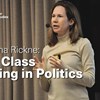dollar
Hilary Greaves: The collectivist critique of effective altruism
Hilary Greaves: Professor of Philosophy at the University of Oxford, and a Tutorial Fellow at Somerville College, Oxford. The previous topic "Reductionism about personal identity, prudential value and
Julia Cage: Rethinking Democracy - Steps to Political Equality and Social and Environmental Justice
Research seminar with Julia Cage, Associate Professor of Economics, Sciences Po Paris Register Abstract Electoral democracies are in crisis. Turnout is at its lowest point in the history of universal sufand argue that the solution involves a radical rethinking of our system of political finance, participation and representation.
Tourism and the Globalization of Emotions. The Intimate Economy of Tango.
[Reissue] New York: Routledge. Throughout the chapters, the author assesses how, in an explosive economic and political context, people's emotional lives intermingle with a tourism industry that has fo
Criminal nomads: The role of multiple memberships in the criminal collaboration network between Hells Angels MC and Bandidos MC
Global Crime vol. 23, no 2 Abstract Outlaw motorcycle gangs (OMGs) have received increased atten-tion from both law enforcement agencies and the research com-munity. This study investigates the criminal
Research seminar with Johanna Rickne: The Class Ceiling in Politics
Venue: Institutet för framtidsstudier, Holländargatan 13, 4th floor, Stockholm, or online.Research seminar with Johanna Rickne, professor of Economics at SOFI, Stockholm University.Register hereAbstracPrior studies have documented that working-class individuals rarely become parliamentarians. We know less about when in the career pipeline to parliament workers disappear, and why. We study these questions using detailed data on the universe of Swedish politicians’ careers over a 50-year period. We find roughly equal-sized declines in the proportion of workers on various rungs of the political career ladder ranging from local to national office. We reject the potential explanations that workers lack political ambition, public service motivation, honesty, or voter support. And while workers’ average high school grades and cognitive test scores are lower, this cannot explain their large promotion disadvantage, a situation that we label a class ceiling. Organizational ties to blue-collar unions help workers advance, but only to lower-level positions in left-leaning parties. We conclude that efforts to improve workers’ numerical representation should apply throughout the career ladder and focus on intra-party processes.

Johanna Rickne: The Class Ceiling in Politics
Research seminar with Johanna Rickne, professor of Economics at SOFI, Stockholm University Abstract: Prior studies have documented that working-class individuals rarely become parliamentarians. We kno
Time to plan for the worst-case scenario
After two of the most damaging hurricanes in history affected the Gulf of Mexico just a few days apart, the impact of climate-induced catastrophes is finally getting some attention. However, in truth,
The Impact of Human Health Co-benefits on Evalutaions of Global Climate Policy
Nature Communications Abstract The health co-benefits of CO2 mitigation can provide a strong incentive for climate policy through reductions in air pollutant emissions that occur when targeting shared s
Partha Dasgupta: Earth's Carrying Capacity and Optimum Global Population
Sir Partha Dasgupta, Professor Emeritus of Economics at the University of Cambridge. ABSTRACT In this lecture I study fertility choice in the face of socio-ecological constraints. I assume that when cho
Erez Maggor: Bidenomics, Industrial Policy, and the Twenty-First Century American Developmental State
Venue: Holländargatan 13, Stockholm Research seminar with Erez Maggor, Assistant Professor at Ben-Gurion University. He studies the political economy of industrial policy and innovation. Register here &








